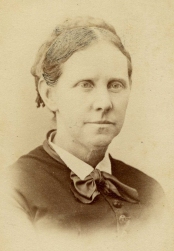Judith Winsor Smith facts for kids
Quick facts for kids
Judith Winsor Smith
|
|
|---|---|
 |
|
| Born |
Judith Winsor McLauthlin
November 26, 1821 |
| Died | December 12, 1921 (aged 100) Boston, U.S.
|
| Known for |
|
| Spouse(s) | Silvanus Smith |
| Children | Sidney, Frances, Zilpha, Mary, Erasmus, Jennie |
Judith Winsor Smith (born McLauthlin; November 26, 1821 – December 12, 1921) was an amazing American woman. She fought for women's rights, especially for their right to vote. She also worked to end slavery.
She was involved in the movement for women's voting rights until 1920. That year, at 99 years old, she voted for the very first time! Judith also helped start the Home Club of East Boston. This was one of the first clubs for women in Massachusetts. She was its first leader.
Contents
Judith's Early Life
Judith Winsor McLauthlin was born in Marshfield, Massachusetts, on November 26, 1821. Her parents were Lewis and Polly McLauthlin. Her family had a long history in America. Her parents were descendants of people who came to America on the famous ship, the Mayflower.
Her father worked for a shipbuilder. Her grandfather was a doctor and an artist. When she was young, Judith moved to Duxbury, Massachusetts. She worked there as a teacher.
In 1841 or 1842, she married Silvanus Smith. He was a shipbuilder from East Boston. They had six children together. One of their daughters, Zilpha Drew Smith, became a well-known social worker in Boston.
The family lived in Duxbury and Pembroke for some years. Then, in 1854, they moved to East Boston. In 1871, they built a home at 76 White Street in East Boston. It overlooked the shipyards. Later in her life, she lived with her daughter in Jamaica Plain. She passed away there on December 12, 1921, at 100 years old.
Fighting for Change
Judith Winsor Smith was a strong activist. She worked hard to make society better. She was involved in several important movements.
Ending Slavery
Judith was part of the movement to end slavery. This movement was called Abolitionism. She was on a special committee for a church led by Theodore Parker, who was also an abolitionist.
In 1920, Judith told a newspaper that her father had also been an abolitionist. She said he even had a "station on the underground railway." This was a secret network that helped enslaved people escape to freedom. Her father was a leader in an anti-slavery group. He also tried to get a law passed in Massachusetts. This law would have stopped anyone from returning formerly enslaved people to their enslavers.
The Home Club of East Boston
Judith was a founder and the first president of the Home Club of East Boston. This club started in 1875. It was the second women's club ever in Massachusetts. At their first meeting, 30 women were there. A famous woman's rights leader, Julia Ward Howe, spoke to them.
Later that year, the club members worked to change a state law. They wanted men to be treated the same as women under a law about "nightwalking." They also started a sewing school for girls. The club raised money for different charities. They sent members to big meetings for women's clubs across the country. The club first met at Judith's home. But it grew so much that they had to move to a local hall. Judith was the club's president for ten years.
Women's Right to Vote
When Judith cast her first vote for president in 1920, she had been working for women's right to vote for over 70 years! This movement was called Women's suffrage. She was the president of the East Boston Woman Suffrage League for many years. She was also on the main committees of several important suffrage groups. These included the Massachusetts, New England, and American Woman Suffrage Associations. She was also a director of the New England Women's Club.
Judith was friends with famous suffragists like Julia Ward Howe, Lucy Stone, and Henry Browne Blackwell. She asked the Massachusetts state government to let women vote in local elections in 1885. In 1905, she asked them to let women vote in elections for school committee members.
When she was 89 years old, Judith stood outside the voting places for two hours on election day. She handed out flyers about women's right to vote. Alice Stone Blackwell was so impressed by Judith. She wrote a poem for Judith's 90th birthday:
For two long hours on election day, not long ago
She stood where the voters streamed past in a row
And gave suffrage leaflets to all who would take them
Now isn't she plucky, and good as they make them?
Judith joined the New England Women's Club in 1873. They honored her at a special event just a few weeks before she passed away in 1921. She also helped start the Dorchester Club and the Fortnightly Club of Winchester.
Judith's Legacy
Most of Judith Winsor Smith's writings and papers are kept at the Massachusetts Historical Society. Some are also in the Woman's Rights Collection at the Schlesinger Library. Family records are at the Drew Archival Library. She is remembered on the Boston Women's Heritage Trail in Jamaica Plain.
 | Ernest Everett Just |
 | Mary Jackson |
 | Emmett Chappelle |
 | Marie Maynard Daly |

